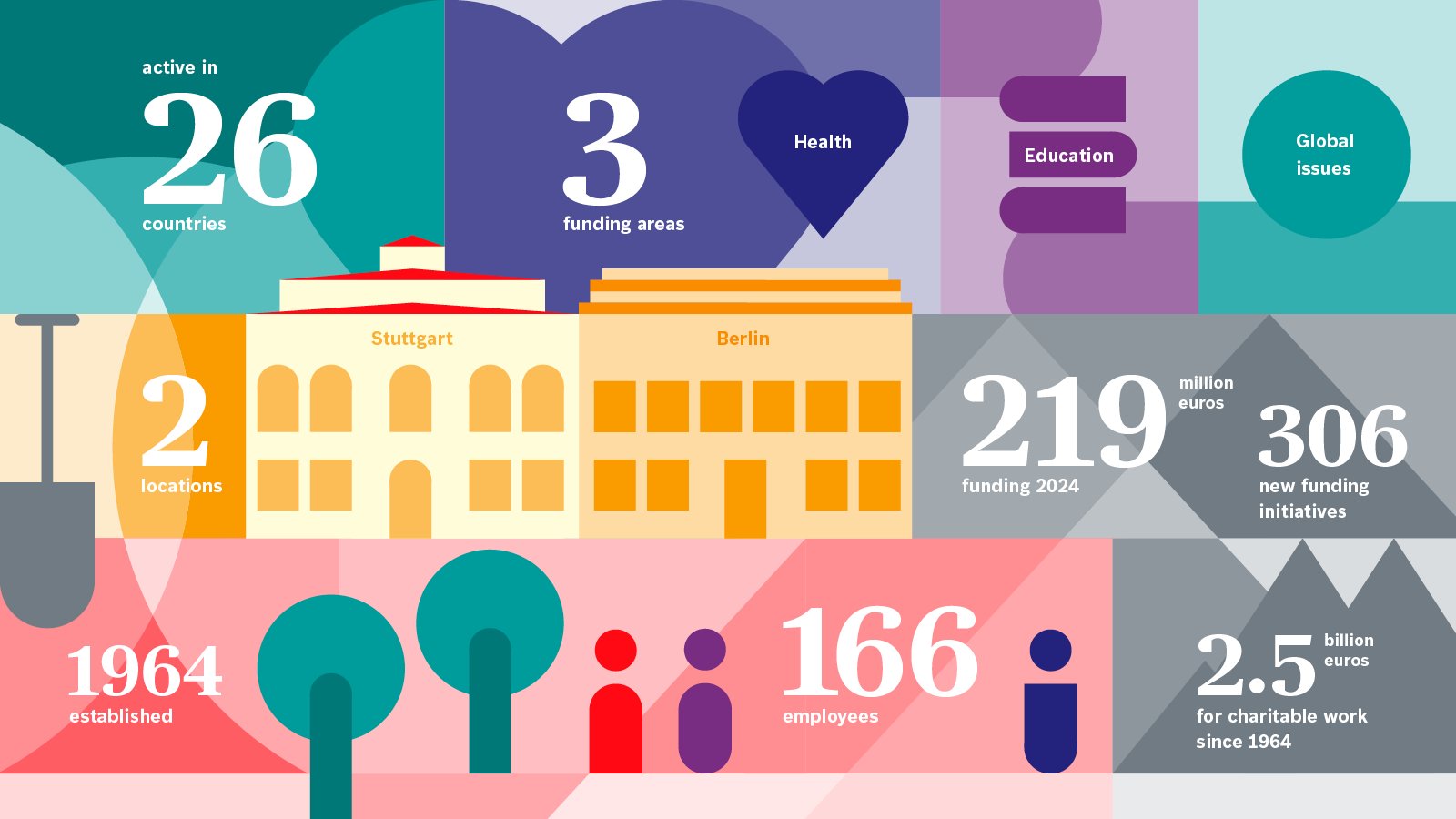Robert Bosch Stiftung Annual Report 2024
Our 2024 Annual Report highlights how we, together with our partners, are developing innovative approaches to tackle global challenges, improve educational opportunities, and shape a healthcare system fit for the future. Discover the facts and figures behind our impact.
In 2024, the Robert Bosch Stiftung was active in 26 countries and launched over 300 new projects. We invested a total of €219 million across our focus areas: health, education, and global issues. The largest share—€151 million—was allocated to the health sector, with a significant portion funding the expansion of the Bosch Health Campus (BHC) in Stuttgart. This integrated campus brings together medical institutions and research centers. By 2030, the Foundation plans to invest over half a billion euros in the BHC.
A Year of Milestones
In 2024, we celebrated three major anniversaries. The Foundation marked its 60th year, continuing the legacy of Robert Bosch, who championed progress in healthcare, equitable education, better living conditions, and peaceful coexistence. This anniversary year prompted a central question: Where have we made a difference over the past six decades?
Alongside our 60th anniversary, two other institutions celebrated their first decade. Since its founding, the Robert Bosch Academy in Berlin has hosted over 100 international fellows who have engaged with some of the most pressing global issues of our time. Meanwhile, the UWC Robert Bosch College in Freiburg has enabled approximately 900 students from more than 130 countries to earn an international secondary school diploma, all while promoting intercultural understanding and exchange.
“None of this would be possible without the extraordinary dedication of our colleagues and partners. Their tireless commitment reflects the values Robert Bosch lived by: taking shared responsibility for the society we live in.”
Insights into Our Work
#IchStehAuf: Schools Take a Stand for Democracy and Diversity
Schools today face not only structural challenges but also growing social tensions. Misinformation, hate speech, and exclusion have become increasingly present in classrooms. To support schools in navigating these issues, the Robert Bosch Stiftung, in collaboration with German public broadcaster ARD and the ZEIT publishing group, launched the initiative #IchStehAuf – Schools for Democracy and Diversity in 2024. Backed by over 100 organizations and under the patronage of German President Frank-Walter Steinmeier, the initiative culminated in a nationwide day of action in June 2024. More than 1,700 schools and over 300,000 students participated in diverse activities aimed at embedding democratic education into everyday school life—well beyond 2025.
The Future of Caregiving
The Bosch Health Campus awarded the 2024 Ideas for Impact Award to innovations that directly benefit patients. The winning project, Stay@Home – Treat@Home, uses telemedicine to monitor and care for people in need at home, easing the burden on the healthcare system.
Recognizing the sector’s reliance on international professionals, the BHC also launched STaF – Social Participation of Foreign Care Workers, in collaboration with the Foundation’s Immigration Society team. At ten locations across Germany, healthcare workers who recently arrived receive mentorship and support to ease their integration into daily life and their new work environments.
Peace Begins Locally
In 2024, the number of deaths resulting from armed conflict hit its highest level since 1994. In light of this alarming trend, we ask: How can we foster lasting peace?
The Robert Bosch Stiftung supports Peace Direct, an organization that empowers local communities to lead peacebuilding efforts. Their approach—local peacebuilding—enhances community participation in political processes, improves access to resources and creates spaces for dialogue. Despite the growing number of global crises, we remain hopeful: with imagination, perseverance, and the right investments, peace is possible.
United for Ukraine
The ongoing war in Ukraine remains a key concern for the international community—and for the Robert Bosch Stiftung. Bringing together heads of state and international organizations, the Ukraine Recovery Conference in June 2024 in Berlin sent a powerful signal.. On the eve of the conference, the Foundation hosted a gathering of around 80 civil society representatives to strengthen Ukraine’s civic sector and contribute to the country’s reconstruction.
To meet the immense challenges ahead, the Foundation continues its support and builds strong partnerships—such as with the newly established Foundations for Ukraine Initiative, which connects philanthropic organizations worldwide to coordinate aid and deploy resources more effectively.
Driving Global Dialogue
In 2024, the Robert Bosch Academy focused on the shifting international order, multipolarity, and the role of non-state actors. Cross-sector and cross-border dialogue is essential to addressing today’s global challenges. To this end, the Academy brought together around 70 current and former fellows for the 10th Richard von Weizsäcker Forum. “The world needs more of these spaces—more opportunities for reflection and dialogue,” said Maria Fernanda Espinosa, former UN General Assembly President and Academy Fellow.
Sustainability and Diversity
To meet its goal of reducing emissions by at least 50 percent by 2030 (compared to 2019), the Foundation advanced its sustainability strategy in 2024. Since 2019, it has systematically tracked its greenhouse gas emissions using the international standards of the Greenhouse Gas Protocol and prioritized reduction through avoidance, minimization, and only as a last resort, offsetting. Employees are actively involved in developing solutions to take environmental responsibility.
In terms of diversity, the Foundation made significant strides in 2024. Since 2023, a diversity officer and advisory board have been implementing a strategy based on four pillars: diversity, equity, inclusion, and belonging. Mandatory training, an inclusive HR strategy, and signing the Diversity Charter are among the steps we have taken. Through the “Vielfalt stiften!” (funding diversity) program, the Foundation also supports graduates with a migration background, enriching the diversity of perspectives in the philanthropic sector.
Want to know more? Read our activity report on screen and explore further insights into the foundation.

